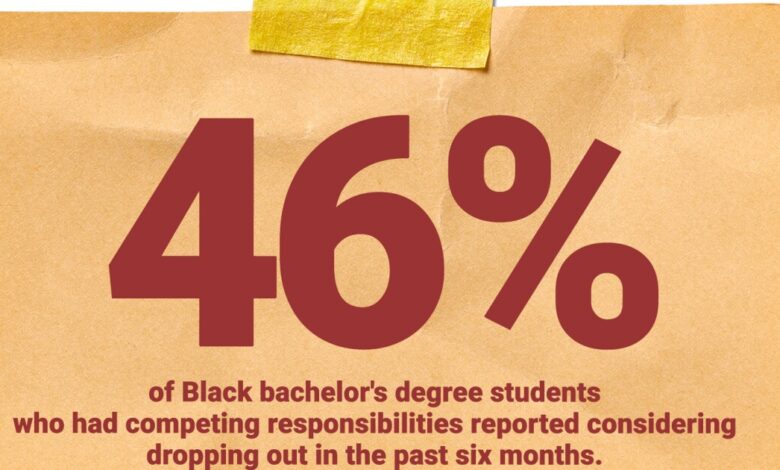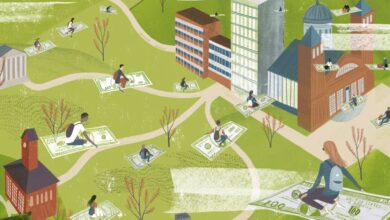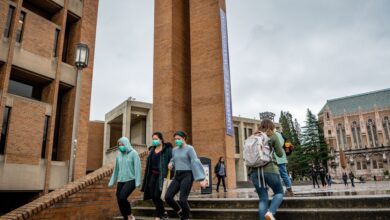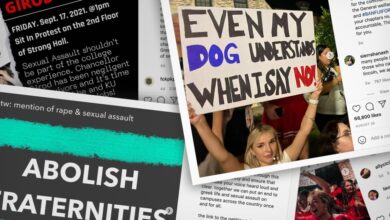For Black Students, 2 Obstacles to Graduation Loom Large: Discrimination and Responsibilities

[ad_1]
Black students in all levels of higher education face added stresses that get in the way of graduation, according to a report released on Thursday. Chief among those barriers, the report says, are racial discrimination and competing responsibilities like work and caregiving.
The report, “Balancing Act: The Tradeoffs and Challenges Facing Black Students in Higher Education,” is based on a survey of roughly 6,000 students conducted by Gallup and the Lumina Foundation. It arrives at a moment when Republican lawmakers in states like Florida, Oklahoma, and South Carolina are scrutinizing campuses’ diversity-and-inclusion efforts, whose advocates say make nonwhite students feel more welcome.
Indeed, Courtney Brown, Lumina’s vice president for impact and learning, suggested that the efficacy of campuses’ diversity efforts can be seen in the statistics. The report says that while 34 percent of Black students at private for-profit colleges reported experiencing discrimination frequently or occasionally, only 16 percent of Black students at public institutions reported experiencing the same. At private nonprofit institutions, that number was 23 percent.
“More public institutions and more not-for-profit private institutions are working really hard on their campuses to ensure that all students feel a sense of belonging, that they are recognizing the importance of diversity and inclusion,” Brown said. “I’m not sure that private for-profit institutions are there yet.”
Overall, 21 percent of Black students said they feel discriminated against frequently or occasionally in their program of study, which Brown called “shocking.” Only 15 percent of other students said they feel the same.
The fact that so many Black students are feeling physically unsafe and psychologically unsafe shows this is not just one experience. … It’s happening at all of the institutions.
The study, which surveyed students in four-year bachelor’s, two-year associate, and certificate programs, found that the less racially diverse an institution’s student body, the more Black students tend to experience discrimination.
Brown said the data point toward a sectorwide problem, which cuts against media attention on individual campus climates. “The fact that so many Black students are feeling physically unsafe and psychologically unsafe shows this is not just one experience at an institution that’s highlighted by the media, but it’s happening at all of the institutions to some extent,” Brown said.
But Black students pursuing their bachelor’s or associate degrees, or a certificate, reported feeling respected by faculty members and other students at similar rates to all students surveyed. Brown said this may be because some institutions are continuing to have diversity training for the faculty and are working toward racial equity, creating an environment where all students are more aware of discrimination.
“It looks like we could do better for all students in those findings, so that everybody feels that sense of respect,” she said.
Discrimination is only one barrier. The survey also found that, compared with all other students pursuing a bachelor’s degree, more Black students in four-year programs tend to shoulder responsibilities that can get in the way of their studies. For example, 36 percent of Black bachelor’s students have caregiving responsibilities or full-time jobs, double the 18 percent of all other students with those responsibilities.
And nearly half — 46 percent — of Black students who have responsibilities competing with their studies have considered stopping their coursework at some point in the past six months, significantly more than the 34 percent of other students with similar responsibilities who have considered dropping out.
Hence, the survey found that Black students pursuing a bachelor’s degree prioritize flexibility and financial aid when deciding whether to stay enrolled in their program. Fifty-nine percent of Black students in bachelor’s programs said greater flexibility in work or personal schedule was “very important,” much higher than the 37 percent of all other students in bachelor’s programs who said the same.
Meanwhile, the number of Black students enrolled in college has been dropping since 2010, when 14.5 percent of all students enrolled in college were Black, according to data from the National Center for Education Statistics. In 2021, Black students made up only 12.5 percent of all students enrolled in college.
Brown said the report shows that colleges need to diversify their faculty and staff, keep doing equity training with everyone, and have a zero-tolerance policy for discrimination.
“These are some really impressive numbers of Black students that are feeling this level of discrimination, and feeling this overwhelming sense of multiple responsibilities that we have to pay attention to,” Brown said. “We have to set policies and practices that are going to actually help all Black students have the opportunity to access and succeed in postsecondary education.”
[ad_2]
Source link






